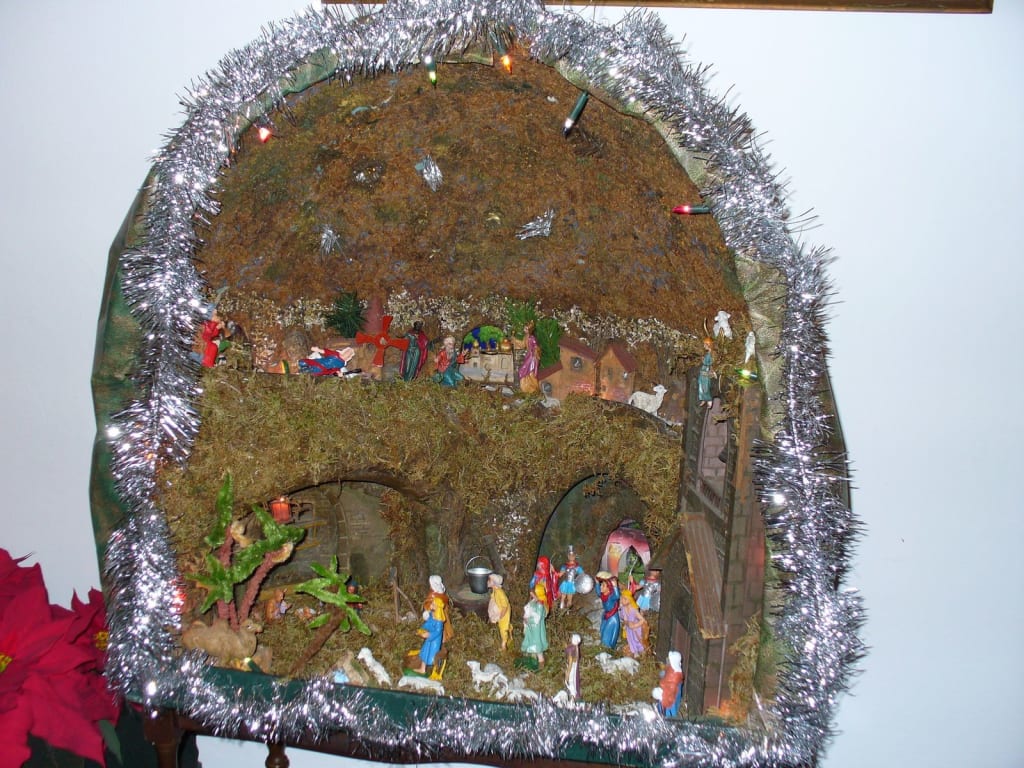
I am thinking about what Christmas was like in the sixties. Not everyone’s, mine.
I lived in a nuclear family: father, mother, me. My brother hadn’t been planned yet. A provincial town in Tuscany, an apartment in a popular neighborhood, furnished in a functional and modern way, because we were a family in step with the times. My mother worked, drove the Bianchina and did the shopping at Smec, the first supermarket to set foot in the center. We lived the economic boom with hope, proud of the progress that would only bring civilization, proud of the refrigerator, the toaster, the blender, the carbonated water with the the Idrolitina, the bottled wine on the table.
In those days, the tree was not decorated in November, nor on December 8, it was not even finished on the fifteenth, it was done on December 22 or 23. And do you know why? Because then time was still time. A month was a long, infinite month. Everything was concentrated in the week of Christmas, the most magical week of the year.
There were no sciroccate and mosquitoes, we went to school with a wool cap and numb knees. The tree was real, it lost its needles on the ground, the house smelled of wood. And the smell of pine mixed with the kerosene of the stove which, from the corridor, was supposed to heat the whole apartment. The balls were made of glass, we bought one every year, new and precious, the lights were not Chinese LEDs but snowmen, little houses, fantastic trains that lit up from inside. There were never missing, hanging from the branches, chocolate figurines and a bag of coins to eat.
I have flashes of me and mom decorating the tree in the living room, it’s Thursday evening, the television is on on Rischiatutto. Mom brought boxes full of silver threads and, for the first time, we decorated the whole house together, attaching them to the doors, to the mirrors. From the chandelier hangs a composition of ribbons and balls that she made with her hands, as an office colleague taught her.
Downstairs lived my grandmother (widow) and my great-aunt (spinster). They went to mass and prepared the crib, (that of the photo)in a corner of the room. A family heirloom, great-grandfather Fortunato had built it in the nineteenth century, obtaining it from a caldano, putting aside foil, cork, pieces of wood. It was beautiful, it had everything: the well, the fountain, the manger, the lantern, even the church with the bells that rang the birth of the child who later founded it. I remember the smell of dry moss, the crowd of shepherds huddled side by side, hand painted, some a little chipped, discolored. I remember the tin stars, the silver thread with the lights. Aunt bought a new thread, sometimes, changed the scotch, but that was the stuff, kept in an earthy shoebox; poor stuff, come to think of it, but I found it wonderful.
And when grandmother taught me to sing “You come down from the stars”, I felt like I was there too, while Jesus was born in the cave ,“in the cold and frost”, the ox and the donkey warmed him with their breath and the comet shone in the sky. I believed everything, it was all true, the Divine Child, Santa Claus who crossed the night to leave gifts under the tree.
At school they celebrated only the last days, just before the holidays, setting up small cribs and trees decorated with something brought from home. I remember one year that the teacher gave everyone a golden and shiny ball to hang on the tree, you opened it and inside there was a little gift for each of us, I had a pink ring. And we wrote Christmas letters, not so much to ask for gifts, but to ask our parents for forgiveness for pranks, to promise to be better, to say “father, mother, I love you”, words that the modesty of the time did not allow us to express on less special days.
The main street of the city was cheered up by the “luminara” but I, even today that I am old, find the decorations of the neighborhood shops more fascinating, the poor ones — the lights that chase each other on the door of the tobacconist’s shop, the colored balls resting on the dusty shelves of the paint shop — I prefer them to the large apparatuses of shopping centers. I love Christmas for ordinary people: the sheet of rock paper, the roll of starry sky, the butcher’s broom and the moss collected in the countryside.
By us, in Tuscany, the Eve was not celebrated, it was an ordinary day, the shops closed late in the evening, not like now that at two in the afternoon everything is already dead and people go to get ready for the dinner, as if it were the last day of the ‘year. It was a day of waiting, of trepidation, of celebration lived inside. We ate normally, not much so as not to weigh ourselves down in view of the twenty-five, we dined in the kitchen as always. Something beautiful was never missing on TV, an enchanted cartoon, a fairy-tale film; I went to bed with my heart in my mouth, a little scared, wondering what would have happened if, by chance, I had spotted Santa Claus. “Because”, my parents explained to me, “those you see around, are not real Santa Claus, they are just disguises to celebrate, He, the original, is mysterious and far away, you cannot see him and he only passes if we are good. “ In short, you must have deserved the gift, you didn’t find it obvious at the Ipercoop. The bearded man dressed in red didn’t do an American-style “ohohoh”, he didn’t live in the North Pole with a reindeer named Blizzard, but he was, rather, a somewhat creepy entity.
On Christmas morning, at “Ceppo”, as the old used to say, we had breakfast with coffee and milk and, still in pajamas, we opened the presents. There was so much stuff that made my eyes widen. Dolls, pots, books, pencils. There was a red basket with a note handwritten by Santa Claus himself: “So that you are more tidy”, there was a record player that, just squeeze it with your finger, and you could hear the “sound tales”, there was the single of “Un cuore matto” — I was madly in love with Little Tony — and also the “Pappa col pomodoro” with Rita Pavone in the role of Gianburrasca.
Grandma and aunt would come up for lunch too, we ate tortellini in broth, boiled capon with Genoa roots, Milan’s panettone that cost a lot of money — not like now that you can find three for the price of two — panforte, ricciarelli, cavallucci, nougat. But also dried fruit, dates from Tunisia with the dancer poised on the toes, zibibbo, dried figs opened as a sandwich and stuffed with walnuts and peanuts.
In the afternoon grandmother and aunt would go back down to their house to rest, while we watched television programs, films, cartoons, theater comedies and, in the meantime, I played with all that stuff that Santa Claus had brought me; you can see that, despite the doubts, fears and guilt, in the end I had been really good. And, of course, I devoured the new books. At Boxing Day, when the other grandmother, the paternal one, was invited, I had already finished them.
There is nothing special about these memories of mine, no message, nothing that characterizes a generation. I can only say that children feed on magical thought and whoever takes it away from them commits a crime, deprives them of the imagination, of desire, of the things that we adults will regret all our lives and will never have again, no matter how hard we try.
About the Creator
Patrizia Poli
Patrizia Poli was born in Livorno in 1961. Writer of fiction and blogger, she published seven novels.






Comments
There are no comments for this story
Be the first to respond and start the conversation.